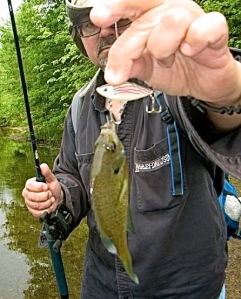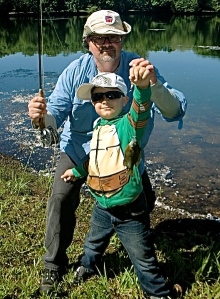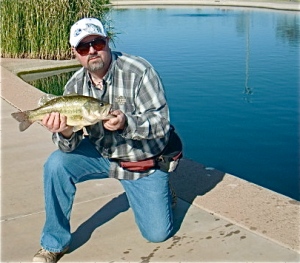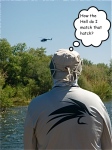What does a fisherman catching a bluegill and a Daimyo (Warlord) ordering a Samurai to commit seppuku (ritual suicide) have in common? They are both affected by perception.
When I lived in Arizona, fishing in the hot dry summer months was summed up in one phrase – brutally tough. “Low” temperatures often hovered in the mid-ninety degree range and high temperatures, more often than not, exceed one hundred and five degrees. Though an occasional largemouth bass can be found in these extreme conditions, the most plentiful species is the humble bluegill. When fishing for bluegill, I adjust my tackle accordingly. I fish a ultra-light equipment with light leaders usually with a 7x or 8x tippet. Catching bluegill in this manner is productive and fun; with each bluegill released, my smile broadens and my mood relaxes more and more.
My suffering through the summer would pay dividends in the late fall when temperatures finally return to a level that is tolerable. It is at this time that Arizona Game and Fish would embark upon an aggressive rainbow trout stocking program. All thoughts and efforts on the water turned to catching that lucent shimmering magnificence that is the rainbow trout. During my quest, it is inevitable that a bluegill will also be caught. It is somewhat disingenuous to the bluegill species that so delighted me during the summer that hooking one now brings a thought of, “Ah, only a bluegill.”
What is different? It is still the same bluegill species that had me smiling all summer. It is still just as much fun to catch. But, it is not a rainbow trout. It is only a matter of perception. My perception of catching and releasing a bluegill has been altered.
As I hit the keys of my laptop producing these words, it is early Spring. After a decade in Arizona, I’ve relocated back to my home state of New Jersey. As I reacquaint myself with the waters of my youth, one goal is ever-present; find fish. Though I’m presently targeting bass and pickerel, I am grateful for any tug on my line. That tug is more often than not provided by bluegill.
Whenever I am fortunate to have my six year old grandson fish with me, the one species that provides consistent action and mile-wide smiles and laughs is, well you already know. Ah, perception once again exalts the status of the bluegill.
Perception affects not only how we technically fish but also how we react to the overall fishing experience. The ancient sages knew the power of perception. In fact, oral traditions and myths told of the ramifications of how perception shapes our world.
Here is a mythical tale from the oral traditions of the martial arts that illustrates how perception can alter the manner in which you perceive a current event. The next time you fish, think of the tale and the manner in which perception affects your fishing reality. It is called the Daimyo and the Samurai.
In feudal Japan there was a powerful daimyo, a warlord. Amongst his many retainers, the daimyo had an extremely loyal Samurai whom he favored. The samurai had accompanied the Daimyo to the Shogun’s Court in far off Edo, many days journey from their home. One day the samurai received an urgent message advising that his father, also a very distinguished samurai loyal to the daimyo’s family, had fallen gravely ill. Being in a hurry to attend to his dying father, the samurai desired to mount his horse and rush home. The samurai found that his horse had become lame and could not make the long journey home. Worried about seeing his ill father, the samurai made use of the daimyo’s favorite horse. This was a serious crime punishable by beheading.
When the daimyo heard of the samurai’s use of his horse, he declared, “The samurai and his father are loyal retainers of my family, what a devout samurai to be so concerned with the welfare of his father that he risked his own life so as to attend to his ill father.”
Business at the Shogun’s Court had concluded and the daimyo returned home to his castle. The samurai went to see his master and they walked in the daimyo’s gardens. The samurai saw the most lovely cherry blossom. He picked it and offered it to his master as a token of his appreciation, saying, “Amongst flowers, the cherry blossom; amongst men, you, my Lord and master.” The other samurai that were in attendance were shocked that he dared to pick a cherry blossom from the daimyo’s favorite tree. The daimyo took the proffered cherry blossom and praised the samurai for his generosity.
As happens in all human relationships, the daimyo and the samurai eventually had a falling out. The daimyo angrily and publicly chastised the samurai, “You impudent servant, you disgraced me by making use of my horse.” “You insulted me by picking my own cherry blossom and giving it to me as a present.” In the presence of the daimyo’s court, the samurai was ordered to commit seppuku (ritual suicide).
The next time you are on the water hunting for a game fish and are “only” catching “junk” fish, think about the Daimyo and the Samurai. Adjust your perception and relax and enjoy the simple pleasure of being outdoors, catching a fish.(See Endnote #1).
I hope you enjoyed the tale and the within exploration as to how perception is a key ingredient in your fly fishing repertoire.
In closing I remain, open to my perception of my world and wishing I could cast a fly into clear water and find a bluegill at the end of my line.
 In the photo I’m wearing an uv protection shirt I purchased from Wicked Catch gear. You can visit their website at http://www.wickedcatchgear.com/fishing-shirts/
In the photo I’m wearing an uv protection shirt I purchased from Wicked Catch gear. You can visit their website at http://www.wickedcatchgear.com/fishing-shirts/
use promo code: WCProstaff-JSzmitkowski at checkout for a 5 % discount (not applicable to shipping costs and taxes). Or, you can also log in with my personal link (as of January, 2015)
http://www.wickedcatchgear.com/#_l_23
ENDNOTES:
1. I had heard this fable several times in the Dojo. I was able to locate a similar tale, which you may also enjoy reading. It is called “The Thief Of The Peach” and may be found in: Furuya, Kensho, Kodo: Ancient Ways (Lessons In The Spiritual Life Of The Warrior/Martial Artist (O’Hara Publications, Inc., 1996) p. 48.
 As a Thank-you for reading, I have listed a two-pack of FlyFishing Dojo on E-bay for only $ 1.75 which includes mailing. To get your FFD sticker two-pack, simply go to e-bay and search “Fishing stickers-FlyFishing Dojo Logo blog” – do not bid more than the $1.75, I’ll keep listing while supplies last.
As a Thank-you for reading, I have listed a two-pack of FlyFishing Dojo on E-bay for only $ 1.75 which includes mailing. To get your FFD sticker two-pack, simply go to e-bay and search “Fishing stickers-FlyFishing Dojo Logo blog” – do not bid more than the $1.75, I’ll keep listing while supplies last.
Sensei John is available for guest speaking engagements. Please see the “GUEST SPEAKING” Page tab above for more information.
Follow FLY FISHING DOJO on FACEBOOK, please send a friend request on Facebook; see our “Video & Media” Page for more information.
Please feel free to “window shop” our unique logo products by clicking on the “SHOP” page tab above. This post’s featured product – FFD Logo Coffee Mug
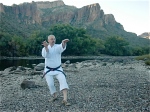 Please feel free to view my other weblog dedicated to exploring karate-do and the intricacies of kata, also special features for the non-martial artist to apply ideology and concepts to daily life at http://senseijohn.me
Please feel free to view my other weblog dedicated to exploring karate-do and the intricacies of kata, also special features for the non-martial artist to apply ideology and concepts to daily life at http://senseijohn.me


